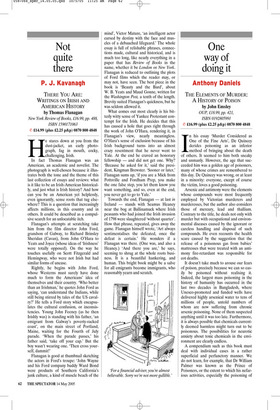Not quite there
P. J. Kavanagh
THERE YOU ARE: WRITINGS ON IRISH AND AMERICAN HISTORY by Thomas Flanagan New York Review of Books, £16.99, pp. 488, ISBN 1590171063 ✆ £14.99 (plus £2.25 p&p) 0870 800 4848 He stares down at you from the dust-jacket, an early photograph, fag in mouth, cocky, challenging, Irish. In fact Thomas Flanagan was an American, an academic and novelist. The photograph is well-chosen because it illustrates both the tone and the theme of this last collection of essays and reviews: what is it like to be an Irish-American historically, and just what is Irish history? And how can you be an American yet helplessly, even ignorantly, sense roots that tug elsewhere? This is a question that increasingly affects millions, in this country and in others. It could be described as a compulsive search for an unlocatable itch.
Flanagan’s attempts at scratching take him from the film director John Ford, grandson of Galway, to Richard Brinsley Sheridan (Cavan), from John O’Hara to Yeats and Joyce (whose ideas of ‘Irishness’ were totally opposed). On the way he touches usefully on Scott Fitzgerald and Hemingway, who were not Irish but had similar forms of unease.
Rightly, he begins with John Ford, whose Westerns must surely have done much to form the Americans’ idea of themselves and their country. ‘Who better than an Irishman,’ he quotes John Ford as saying, ‘can understand the Indians, while still being stirred by tales of the US cavalry?’ He tells a Ford story which encapsulates the cultural confusion, or inconsistencies. Young John Feeney (as he then Irishly was) is standing with his father, ‘an emigrant from Galway’s poverty-racked coast’, on the main street of Portland, Maine, waiting for the Fourth of July parade. ‘When the parade passes,’ his father said, ‘take off your cap.’ But the boy wasn’t wearing one. ‘Then cross yourself, dammit!’ Flanagan is good at thumbnail sketching the actors in Ford’s troupe: ‘John Wayne and his Ford company buddy Ward Bond were products of Southern California’s junk culture, a kind of muscle beach of the mind’, Victor Mature, ‘an intelligent actor cursed by destiny with the face and muscles of a debauched lifeguard.’ The whole essay is full of relishable phrases, connections made, cultural and historical, and is much too long, like nearly everything in a paper that has Review of Books in the name, whether it be London or New York. Flanagan is reduced to outlining the plots of Ford films which the reader may, or may not, have seen. The best piece in the book is ‘Beauty and the Bard’, about W. B. Yeats and Maud Gonne, written for the Washington Post, a tenth of the length. Brevity suited Flanagan’s quickness, but he was seldom allowed it.
What comes out most clearly is his bitterly witty sense of Yankee Protestant contempt for the Irish. He decides that this has caused a hole that goes right through the work of John O’Hara, rendering it, in Flanagan’s view, nearly meaningless. O’Hara’s sense of exclusion because of his Irish background turns into an almost crazy resentment that he never went to Yale. At the end he craved an honorary fellowship — and did not get one. Why? ‘Because he asked for it,’ said the president, Kingman Brewster. ‘Sooner or later,’ Flanagan sums up, ‘if you are a Mick from Pottsville and Fordham Prep, you make the one false step, you let them know you want something, and so, even at the end, you never get to go to Yale.’ Towards the end, Flanagan — at last in Ireland — stands with Seamus Heaney near the bog at Ballinamuck where Irish peasants who had joined the Irish invasion of 1798 were slaughtered ‘without quarter’. How that phrase, repeated, gives away the game. Flanagan himself wrote, ‘Art always sentimentalises the defeated, once the defeat is certain.’ He wonders if a Flanagan was there. (One was, and also a Heaney.) ‘And there you are,’ he says, seeming to shrug at the whole roots business. It is a beautiful hankering, and human. This bright book might be a salve for all emigrants become immigrants, who reasonably yearn and scratch.


































































 Previous page
Previous page